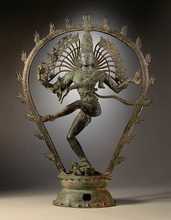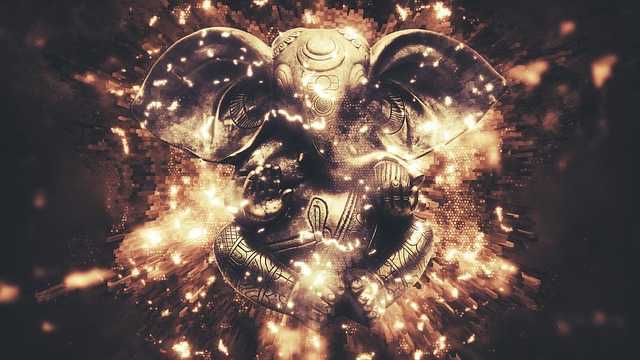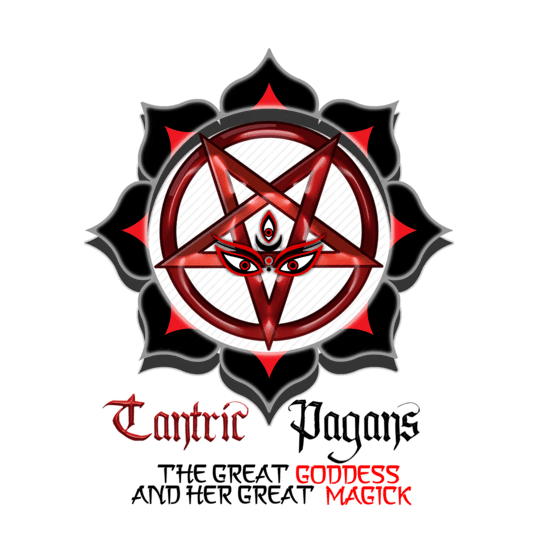Idol worship &Idolatry: A meta-psychology for transcendence

Human-kind has been practicing idol worship and Idolatry from at least the upper paleolithic era, according to known evidence.
Even if there were no sculptures erected and consecrated in certain cultures (think of certain shamanistic and nomadic tribal cultures), personalization of aspects of the universe into communicable forms as deities or spirits were still utilized dating as far back as the dawn of our kind. Even cosmic temporal elements, in the form of astrological patterns in the sky that reflected the quality of the time we lived in, were anthropomorphized into forms.
Note: The word "Idol" has many negative connotations attached to it today and may not be the appropriate term to use in some circles. In some academic circles also, "image" or "form" is now preferred and you may want to use those terms instead. The origin of the word:

Whatever may be the reason, in this context the original meaning is intended. Anything other than the formless absolute (which cannot be conceptualized by our limited minds) has a form. By merely trying to think about the formless, one inevitably conjures a form.
It is almost as if idol worship is programmed into our genetic code, helping us exteriorize aspects of our psyche, enabling us greater access to our subconscious, and by extension perhaps, the collective unconscious of our species as a whole. This is somewhat reflected in Jung's observations of symbols and archetypes.
Indeed, children play as if their toys were real and had personalities. It is well known that play among lion cubs for example, help them hone their hunting and stalking skills for when they grow up. As humans, we evolved not merely as hunters but also as psychologically complex beings. Perhaps personalizing toys are a means to hone the skills for Idol worship as adults, which is in turn a way to access and communicate with our psyche in the most efficient and deep way as possible?
Download this FREE as book- Understanding Deities & Deity Worship

You will also receive articles guides and offers on Tantra, Magick, Esotericism and related topics to your email. Of course, you get to unsubscribe anytime!
It was not until the proliferation of Abrahamic religions, which accounts for a very narrow slice in our history that idol worship was largely condemned and shunned (at least in the west). But even in such religious groups, idols continue in forms such as Jesus and Mother Mary or even as places of worship.
In an age where scientific rationalism and materialism is ever expanding, Idol worship and deity veneration seems to be at a decline at even greater speeds than before. But according to studies conducted, paganism is growing dramatically.
If we are so inclined to idol worship, and if it is part of who we are, there seems to be nothing wrong in doing so.
But what are the benefits in idol worship and venerating a particular deity? If you are a pagan or an occultist of any kind, you may not even ask this question, but nevertheless this shall be the subject of this article and the content here may help you organize your thoughts:
Idol worship as a meta psychological tool and doorway to the magickal realms

You may think of the practical use of idol worship from the standpoint of Jungian archetype, as a means to self-engineer your psyche. However, in my view, it is not a full picture — the Jungian and psychological derivation is but a subset of the larger picture.
In the present day rational, materialistic climate, the existence of a magickal realm is largely scoffed at. Even perfectly rational standpoints such as Idealism, subjective idealism (or even solipsism) is looked at in a way (and this is already discussed in the article on Shamanism and the use of psychedelics), that they are irrelevant because they do not have any predictive value.
For example, the physical law of thermodynamics and newton's law of gravitation is going to manifest itself, regardless of whether or not you believe there is only an objective reality.
It maintains that, since the materialistic, scientific findings are consistent with our subjective experiences, it is highly reliable, and so, it is the only thing that is relevant.
Science enables us to navigate the universe using mathematical tools as placeholders for thought and other apparatus.
However, the only practical end result of such an endeavor seems to be to arrange material in a manner that enables us to gain more comfort, efficiency and power. It must also be remembered that these tools and models are not intrinsic to the universe, but to our neurological mechanism.
It seems to be the only way to go about in the world today and from the post-renaissance period, it is the only tool we have honed and strive to perfect.
Food for thought: Are the neurological structure of and the physical contents (and the scientific, mathematical study of it, even) of the brain contained within the subjective, intangible consciousness or is consciousness a byproduct of the physical structure?
We very well know that the "perception horizon" of the objective world and the contents of thereof, even through using tools (mathematical and scientific) that enable us apparent independence from our senses and biases are still fundamentally limited and produced by our sense perceptions and neurological mechanism. Therefore, does it not mean that the line of separation between the objective and the subjective, is arbitrary?
However, this was not always the case. Alchemical thought (see above example) was primary, and all sciences have “evolved” from the pursuit of such thought. Alchemists of the past used to associate mythological and psychic contents and processes of the subjective towards the objective, such as various metallurgical processes. They didn't see the objective processes as “condensation of sulphur”, for example. Instead, they associated them to various visions of psychical origin like the “arrival of the Eagle” and the “burning of the salamander”; sort of like a synesthesia.
Indeed this seemed to have worked not only from the direction of the objective to the subjective as a form of codification, but also from the the subjective to the objective. They would project the contents of the psyche INTO the objective and figure out new compounds, alloys, herbal remedies etc.!
A very good, relatively modern example of this is the discovery of the benzene ring by the chemist August Kekulé: “He said that he had discovered the ring shape of the benzene molecule after having a reverie or day-dream of a snake seizing its own tail (this is an ancient symbol known as the ouroboros).”
A more earth shattering example would be that of the foundation of modern rationalism and materialism by René Descartes itself — while stationed as a soldier in Neuburg an der Donau, he shut himself in a room with an “oven” to warm himself up. Inside, a divine spirit revealed to him a new philosophy through a series of three dreams. After this, he formulated analytical geometry and the idea of applying mathematical method to philosophy. His visions promoted him to pursue science and the scientific method for true wisdom for himself. He saw that proceeding with logic will open ways to all science, and that all truths were linked to one another.
How deep then, does the contents of the psyche go? The voice that spoke to Plato and his contemporaries was referred to “Logos”. Logic was conflated with the divine spirit that permeated all things.
A more detailed account of alchemy deserves an article on its own, but Idol worship and deity reverence can be thought of as an alchemical process of anthropomorphizing the logos. Today, we think of this as the voice of the ego or the “controller”. However, the ego is better thought of as a microcosmic extension of all there is, and therefore controlled by all there is.
Indeed, in the discipline of Tantra, the various goddess forms are considered as anthropomorphisms of the Kundalini Shakti. The Kundalini Shakti (in her dormant form) is nothing but the ego or the “lower controller” itself. Before she awakens, she powers and identifies herself with the illusory Ahamkara or "ego".
The various processes that happen in your body happen involuntarily, beyond our control — the beating of the heart, the digestion, temperature regulation etc. Similarly, much of the contents of the psyche happen involuntarily also, and this is often referred to as the subconscious. But going further, even the apparently conscious decisions you make can be thought of this way . Even from a scientific standpoint then, the universe “does” you, but you simply have the perception of being a separate entity.
Or conversely, on a more optimistic note (that various Eastern religions and philosophies also insist to be true), you ARE the universe and the illusion is that you are not. This seems like the idea behind the Kundalini Shakti identifying herself with the Ahamkara, only seen from a different angle.
Idol worship can then be thought in this context as a sort of a delegation of the function of “yourself”. It can be thought of as a psychological method to navigate the world through a better access of logos, by giving it a personality that you can relate to emotionally and deeply, as a human species.
With this, all sorts of access to various forms of magickal powers (The tool of science can be thought of as a subset of this) seem to become accessible.
Even in apparently atheistic philosophies such as Buddhism, Idol worship is conducted — for instance the worship of various forms of Buddhas, the worship of Tara and Avalokiteshvara in Tibetan Buddhism etc. However, the goal here is to use these idols as a “bridge” for the human mind towards realizing the formless infinite, for the formless infinite cannot be conceptualized by the human mind. Even if you try to think about it, you inevitably give a form to it. Therefore, the idol or the deity is used as a springboard.
Various forms of spirits can also be thought of as personalizations of subtle aspects of the psyche-material complex. This is discussed in the article on spirits and I highly recommend you read it.
With our ordinary consciousness, we seem to be living in the attic of the self with the rest of the house thoroughly shut away and uninhabited. In psychedelic states and other altered states of consciousness, this becomes apparent and we are able to access these floors.
The deity or the idol acts as a conduit or personality bridge to these aspects of ourselves during normal, waking consciousness.
Consensus reality and group idol and deity worship
What is agreed to be “real” is consensus reality:
“Consensus reality refers to the agreed-upon concepts of reality which people in the world, or a culture or group, believe are real (or treat as real), usually based upon their common experiences as they believe them to be; anyone who does not agree with these is sometimes stated to be "in effect... living in a different world."
Slight inconsistencies and differences among individuals may vary, but overall the normalization of all subjective experiences is thought to be reality.
Download this FREE as book- Understanding Deities & Deity Worship

You will also receive articles guides and offers on Tantra, Magick, Esotericism and related topics to your email. Of course, you get to unsubscribe anytime!
This, coupled with our early discussion about alchemical thought, the one where there is no difference between the contents of the psyche and the objective processes, pre-existing deities with solid names, sigils, yantras etc. can be thought of as meta-psychological archetypes that have evolved in the collective psyche of a group of people and therefore solid and real in the consensus reality.
For example, Shiva is a deity that has evolved in the collective consciousness of the Indian mind over many thousands of years. Although, if we go back in time, Shiva was Rudra. The destroyer archetype can be traced back even further in time to hunter gatherer period and beyond, but the deity has become solid in the consensus reality matrix over the years through processes handled by the universe itself.
The universe essentially “did” the process of evolving and personalizing the deities in the collective psyche of the human mind and therefore they are real in that sense, if not more real than you and I because of its acceptance in consensus reality even more than you and I are (There is a reason why celebrity figures are often referred to as “Idols” or “Icons”). The subjective and the ethereal is far more real and lasting than the objective. For instance, a poet's poem will live on, even after he has passed.
The deities can be thought of as manifestations of the meta-archetypes within the human psyche, but conversely, our psyche can be thought of as composed of those meta-archetypes that emanate from the formless infinite.
And therefore, an already popular deity or idol is more likely to be potent and powerful than one that you create (although that could work just as well, because your creation after all, is the universal creation).
Same can be said for a consecrated statue figure in a temple where there is a constant influx of “validation” of the idol. The statue or the idol then, gets charged to become powerful over time.
Choosing an idol or a deity

Now how can one start to practically make use of all this?
While it would be impossible for this article to contain details of all the deities and idols out there, and the different articles of veneration associated with each, the stage can be set by discussing how to choose the appropriate idol or a deity.
The most ideal is of course, when a deity form shows up by itself in your life, either by various synchronous events or through the means of various altered states of consciousness including dreams.
However, since the universe “does” you, you don't have to wait and can proceed to voluntarily choose one yourself.
What deity or idol is best for you will depend on your psyche of course, but for men, a female deity in the form of a mother figure and for women, a male deity in the form of a son seems to be the most psychologically effective in terms of developing a deep attachment.
Note: Your “preference” may differ from what your psyche may actually connect to, in the end. Therefore, do not simply rely on mental preference. Picking a deity or an idol is not the same as picking a car. Instead, listen deeply to your heart's intuition.
After deciding the gender and the type of relationship you can most effectively work with, the next step would be to figure out the temperament of the deity. This can be divided into two:
- Fierce/dark (Example - Kali, Lilith)
- Gentle/light (Example - Krishna, Gaia, Jesus)
Of course, some deities will possess attributes from both, but the idea is to decide on what temperament you can most relate to, and develop a deep love relationship with.
The next step would be to pick a culture/pantheon that you can most relate to. The magickal system you are most drawn to can also be used for this purpose. For example, if Tantra is your chosen system, then you may work with goddesses like Kali, Tara and the like.
Finally, you pick the deity itself and attempt to make a connection with him/her. Some deities may not respond well to every personality, but that is okay. Experimentation is key to this step.
Building an altar for your preferred deity and learning about the lore and story behind the deity, as well as its’ characteristics is going to be paramount. An altar with the deity's physical statue will not only act as a head space where you can tune-in more effectively, but will also act as a space where the deity gets accrued more and more over time.
In closing
Develop a deep love relationship with the deity, to a point where your identity becomes merged with that of the deity. Be loyal to your chosen deity/idol and trust in it completely.
This will be your Kundalini Shakti, and if you have a great relationship with it, you avoid all the perils, pitfalls and side effects that come with awakening the Kundalini for the love you have for it will be reciprocated manifold.
